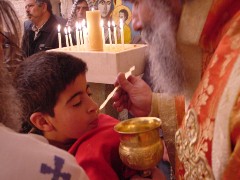 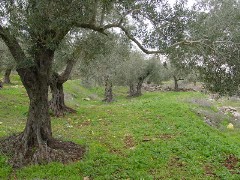 The
sounds of Zababdeh: The
sounds of Zababdeh:
4:30 AM, Rooster (3 sec.) 4:45 AM, Muslim prayer (40 sec.) 6:00 AM, Church bells (40 sec.) 6:30 AM, sheep 7:30 AM, National Anthem (40 sec.) 24-7, Electrical generator (5 sec.) |
|
Friday 3/1/02: Ah, lovely Friday, beautiful Friday. A chance to sleep late and recharge our batteries. When we finally woke up, we could hear and see the Apache helicopters in the distance heading over the hills towards Jenin. Balata refugee camp was hit today in Nablus - and hit hard according to the initial reports we've gotten. These people, refugees from the 1948 War and their descendants, were refugees again today as the Israeli army told them to leave while they conducted house-to-house searches. Many preferred to stay, remembering quite well what happened the last time they left their houses "for a little while". Right in the middle of Balata camp is the Orthodox church of Jacob's Well, being overseen by Abuna Justinus. Fortunately for him, he had gone to visit Greece a week ago and has missed all the excitement. Speaking of excitement, the night-time shooting around the Israeli military camp near Zababdeh has returned with a vengeance. |
|
Saturday 3/2/02: Another cancelled school picnic today. This one was for the 10th graders - again, it just doesn't seem appropriate to enjoy a journey in the hills when many of their fellow students aren't able to sleep at night from the bombardment of Jenin camp. But missing the picnic wasn't such a hardship - Marthame was fasting today (and yesterday) in the fashion of the Greek Orthodox. Adults who wish to receive communion don't eat any meat or dairy for two days before Sunday mass. Sunday morning, the first thing that they eat is the eucharist. It's a spiritual discipline that they maintain strongly, almost canonically. We, on the other hand, are just spiritual practice opportunists...The girls' basketball game was cancelled, too, with a nearby village. Later in the morning, word came that Jenin was open - taxis were coming and going, but traffic was light. Perhaps things will open up again soon. We visited with neighbors later on this evening, watching the near-constant companion of the TV News. Both Israeli and Arab channels brought the shocking scenes from Balata - the already squalor-like conditions have been brought lower with large holes busted between apartment walls to allow soldiers to pass from one to another more quickly. A good friend of ours who works in Israel told us about his return trip home to Zababdeh. When he approached the border, the soldier leveled his M-16 at him and made him demonstrate - from a distance of some 50 meters - that he wasn't carrying any explosives. Attacks at checkpoints are on the rise, and the soldiers, many of them scared 18 year-old kids, are not taking many chances. But, beyond the call of security, people have also been shot, detained, beaten without reason, fearing for their lives. After relating his trip, our friend was visited by a colleague who is a Jehovah's Witness. She stopped by to discuss religion and the Bible with us (yes, Jehovah's Witnesses in Zababdeh). The debate became a bit tiring (especially trying to dialogue with someone who claims with authority that Matthew was originally written in Hebrew and that the word "Jehovah" appears 350 times in the New Testament in Greek, and that she has seen both with her own eyes - neither is remotely true). Our pleasant evening was topped off by the news of another suicide attack in Israel. More casualties, more deaths, more crippling of this place. |
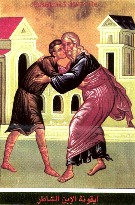 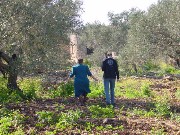 Sunday
3/3/02: We worshiped today with the community at St. George's
Orthodox Church. The lectionary was the story which most of us know
as the Prodigal Son (interestingly known as "The Wise Son" in Arabic -
because he returns in the end) from Luke 15. In some ways, the Western
Church has played the role of the younger son, heading off to a far off
land to live in splendor while forgetting the mother (father?) church here. Sunday
3/3/02: We worshiped today with the community at St. George's
Orthodox Church. The lectionary was the story which most of us know
as the Prodigal Son (interestingly known as "The Wise Son" in Arabic -
because he returns in the end) from Luke 15. In some ways, the Western
Church has played the role of the younger son, heading off to a far off
land to live in splendor while forgetting the mother (father?) church here. 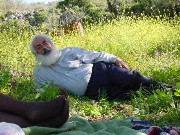 The
Eastern Church, like the older son, has stayed in the land of its birth
and ministered faithfully. When we from the West do come to visit,
the welcome we get is much like that of the younger son's - the overwhelming
generosity of Arabic hospitality. Today was no exception - after
church, we headed off to Abuna To'mie Daoud's family land on the road towards
Misilye. He's building a house there, with a chapel for daily prayer.
They have a well for water, olive and almond and fruit trees, garlic and
onion and spinach and potato plants, and they're going to build a chicken
house. Abuna To'mie also showed off their homemade wine and vinegar
from their own grapes. Self-sufficiency. They've invited us
to come live with them, too! We dined on traditional musakhan,
made of bread fried with olive oil, onions, sumac, and almonds and topped
with chicken. When Abuna To'mie discovered Marthame had fasted like
the Orthodox without receiving communion, he was baffled - "why would you
put yourself through that without the reward of the eucharist?" "Because
I'm not Orthodox." "Nonsense! You fasted like the Orthodox,
and you are a Christian. That's enough." Now we know.
From their land, we could see the Jenin-Zababdeh traffic. Very light
- taxis going and coming, but few passengers. No one much wants to
take a chance on getting caught there. The
Eastern Church, like the older son, has stayed in the land of its birth
and ministered faithfully. When we from the West do come to visit,
the welcome we get is much like that of the younger son's - the overwhelming
generosity of Arabic hospitality. Today was no exception - after
church, we headed off to Abuna To'mie Daoud's family land on the road towards
Misilye. He's building a house there, with a chapel for daily prayer.
They have a well for water, olive and almond and fruit trees, garlic and
onion and spinach and potato plants, and they're going to build a chicken
house. Abuna To'mie also showed off their homemade wine and vinegar
from their own grapes. Self-sufficiency. They've invited us
to come live with them, too! We dined on traditional musakhan,
made of bread fried with olive oil, onions, sumac, and almonds and topped
with chicken. When Abuna To'mie discovered Marthame had fasted like
the Orthodox without receiving communion, he was baffled - "why would you
put yourself through that without the reward of the eucharist?" "Because
I'm not Orthodox." "Nonsense! You fasted like the Orthodox,
and you are a Christian. That's enough." Now we know.
From their land, we could see the Jenin-Zababdeh traffic. Very light
- taxis going and coming, but few passengers. No one much wants to
take a chance on getting caught there. |
|
Monday 3/4/02: Our Jenin students are still missing. The road was cut off again late in the afternoon yesterday, apparently, so Marthame is still subbing for an absent teacher. There were also more bombings in Israel proper today, including one in nearby Afula which - were the road open - we would occasionally pass through. While we were eating lunch on our porch, we saw three UN vans and a UN jeep racing by on the University road with their sirens wailing. No telling what happened or what will happen. We spoke with a friend who works at the University. She was deeply depressed. She told us that the head of the Jenin Red Crescent Society was killed when an Israeli tank opened fire on the ambulance he was in. Since it blew up soon after, the army claimed it was carrying explosives - as opposed to oxygen tanks, as later reports confirmed (and a little common sense would indicate). She knew him quite well, and we knew of him - Dr. Khalil had come to the school quite a few times to give First Aid training to the Scouts - all without taking a dime. This is the closest we've been to any of the more than 1100 Palestinians and 300 Israelis killed in the last eighteen months - eery. Very eery. There are worries that the Israeli army, hot on the heels of Sharon's frightening message of "hitting the Palestinians harder", is preparing to enter more and more Palestinian villages conducting house to house searches. People here are feeling worried, sad, angry, and hopeless. |
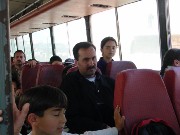 Tuesday
3/6/02:Deja vu - not a pleasant sensation around these parts.
We closed school at 12:00 (an hour and a half early) today. Israeli
tanks had apparently come to the edge of Tubas,
so we were anxious to get our many Tubas students and teachers back home
to their families. We had done the same back in September,
so the students knew to be nervous when school was closed early.
We lied through our teeth that nothing was wrong. Several of the
younger students were weeping and shaking on the drive home. It didn't
help matters when some of the boys looking out the bus windows began shouting,
"Tank! Tank! There it is - close to your house. And there's
another one - it's moving!" We dropped them all off near home, walking
one distraught second-grader a good mile over the hills to her house.
Fortunately, there was nothing happening within the village itself, but
who knows what tonight will bring. The tanks are there for a reason. Tuesday
3/6/02:Deja vu - not a pleasant sensation around these parts.
We closed school at 12:00 (an hour and a half early) today. Israeli
tanks had apparently come to the edge of Tubas,
so we were anxious to get our many Tubas students and teachers back home
to their families. We had done the same back in September,
so the students knew to be nervous when school was closed early.
We lied through our teeth that nothing was wrong. Several of the
younger students were weeping and shaking on the drive home. It didn't
help matters when some of the boys looking out the bus windows began shouting,
"Tank! Tank! There it is - close to your house. And there's
another one - it's moving!" We dropped them all off near home, walking
one distraught second-grader a good mile over the hills to her house.
Fortunately, there was nothing happening within the village itself, but
who knows what tonight will bring. The tanks are there for a reason. |
|
Wednesday 3/7/02: The Tubas students and teachers were back in school today. Apparently, there was shooting, but nothing to warrant headlines. The Jenin students were back, too, if a bit late. However, those beyond Jenin, including the teacher for whom Marthame is substituting, are not - neither is Elizabeth's voice, knocked out by a nasty cold. While she spent the day commuting between the bed and the TV, Marthame headed to school and then off in the afternoon to play soccer. It was a good chance to get some of the pent-up emotional baggage of the last few days out. The night brought more F-16s flying over the valley and a little bit of gunplay in the hills. Strange how all of this becomes "normal" really fast. |
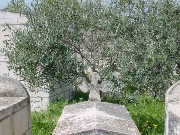 Saturday
3/9/02: All of our students were able to come to school today!
Praise God. The students from Jenin were all on time, but those from
beyond Jenin - including two teachers - were late. But they made
it, nonetheless. An answer to prayer. We just hope they'll
be able to continue coming. Some of the 12th grade students have
taken the extreme step of renting apartments in Zababdeh so that they will
continue to be able to come - of course, this means being apart from the
parents and families, but it means that they might be able to succeed with
the tawjihi (12th grade comprehensive) exams. Abuna Aktham
announced today that we are collecting money from the students to take
to the families of victims in Jenin refugee camp. The students came
forward, despite their tentative financial circumstances themselves, to
lend a hand. We'll be going in a few days to pay our condolences.
Today was also the Greek Orthodox "Feast of the Dead," not unlike the Western
Christian practice of All Souls' Day (which
has become candy-filled Halloween celebration). The overwhelming
sound of the electric motor (audio -
5 sec.) was turned off for the duration of the brief service. Families
of those who had died in the past year handed out sweets to those who came
to pay their respects. It seems like death is simply everywhere. Saturday
3/9/02: All of our students were able to come to school today!
Praise God. The students from Jenin were all on time, but those from
beyond Jenin - including two teachers - were late. But they made
it, nonetheless. An answer to prayer. We just hope they'll
be able to continue coming. Some of the 12th grade students have
taken the extreme step of renting apartments in Zababdeh so that they will
continue to be able to come - of course, this means being apart from the
parents and families, but it means that they might be able to succeed with
the tawjihi (12th grade comprehensive) exams. Abuna Aktham
announced today that we are collecting money from the students to take
to the families of victims in Jenin refugee camp. The students came
forward, despite their tentative financial circumstances themselves, to
lend a hand. We'll be going in a few days to pay our condolences.
Today was also the Greek Orthodox "Feast of the Dead," not unlike the Western
Christian practice of All Souls' Day (which
has become candy-filled Halloween celebration). The overwhelming
sound of the electric motor (audio -
5 sec.) was turned off for the duration of the brief service. Families
of those who had died in the past year handed out sweets to those who came
to pay their respects. It seems like death is simply everywhere. |
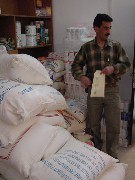 Sunday
3/10/02: Marthame shared in worship leadership at St. Matthew's
Anglican Church and Father Hossam. Because of the situation in the
area, the anticipated changes in pastorates are being re-evaluated.
Father Fadi, a Zababdeh native, was here this morning, and we expect that
between the two of them responsibilities will be shared for Nablus and
Zababdeh. The gospel passage this morning was from Luke 8, the Parable
of the Sower. Three years ago, this had been the lectionary passage
(but from Matthew) on a particularly powerful Sunday for us in Wilmette,
Illinois: over the July 4th holiday, a young man named Benjamin Nathaniel
Smith (from Wilmette) went on a racially-motivated killing spree through
Chicago and into Indiana. One of his victims was Ricky Byrdsong,
a former Northwestern University basketball coach, whom Smith shot as Byrdsong
was out walking with his kids. In the days that followed, incredible
hope grew out of what was originally a situation of unfathomable tragedy
- our church in Wilmette
and Byrdsong's church in Evanston
began a remarkable relationship that transcended many boundaries and planted
many seeds on good soil. Marthame and his colleague preached the
following Sunday in the wake of the killing spree. There are sermons
that come after events like that which all preachers know are important
- post-September 11, post-Oklahoma City, post-Columbine, etc. Here,
pastors have to come up with that "response to tragedy" sermon every week...People
of the village have been gathering food and money for the victims of Jenin
Camp from the recent Israeli attack. We will probably go as part
of an official delegation tomorrow. Sunday
3/10/02: Marthame shared in worship leadership at St. Matthew's
Anglican Church and Father Hossam. Because of the situation in the
area, the anticipated changes in pastorates are being re-evaluated.
Father Fadi, a Zababdeh native, was here this morning, and we expect that
between the two of them responsibilities will be shared for Nablus and
Zababdeh. The gospel passage this morning was from Luke 8, the Parable
of the Sower. Three years ago, this had been the lectionary passage
(but from Matthew) on a particularly powerful Sunday for us in Wilmette,
Illinois: over the July 4th holiday, a young man named Benjamin Nathaniel
Smith (from Wilmette) went on a racially-motivated killing spree through
Chicago and into Indiana. One of his victims was Ricky Byrdsong,
a former Northwestern University basketball coach, whom Smith shot as Byrdsong
was out walking with his kids. In the days that followed, incredible
hope grew out of what was originally a situation of unfathomable tragedy
- our church in Wilmette
and Byrdsong's church in Evanston
began a remarkable relationship that transcended many boundaries and planted
many seeds on good soil. Marthame and his colleague preached the
following Sunday in the wake of the killing spree. There are sermons
that come after events like that which all preachers know are important
- post-September 11, post-Oklahoma City, post-Columbine, etc. Here,
pastors have to come up with that "response to tragedy" sermon every week...People
of the village have been gathering food and money for the victims of Jenin
Camp from the recent Israeli attack. We will probably go as part
of an official delegation tomorrow. |
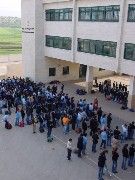 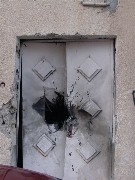  Monday
3/11/02: All the teachers and students from all of their villages
came to school
on time this morning (well, a few were late, but
they're the kids who are always late)! Wonderful news. People
have renewed hope that Zinni's visit may bring peace here. On the
one hand, you want to celebrate the optimism and hope that this signals.
On the other, you want to question its naivete. In the afternoon,
we joined the official delegation from Zababdeh as it headed up to Jenin
Camp. Elizabeth was the only woman in the number, but she was welcomed
as openly as the rest of the group, even as she shook hands and sat in
the Beit al-'Azza, where men were mourning the camp's dead (Both
Christians and Muslims have intensive periods of visitation following a
death, and for both, men and women mourn separately). Abuna Aktham,
Zababdeh's mayor, Zababdeh's sheikh, and
leaders of the town's political parties and societies were all represented.
The group had collected money and food for the people of the refugee camp
for the families who had been hit so hard during the recent Israeli incursion.
All told, it was about 7000 shekels ($1800) and enough food for 50 families
for a week. At a time when the people of Zababdeh are suffering themselves,
it was quite impressive to see the powerful message that supporting one
another in our times of crisis is important. We dropped off the food
and then made our way the to UNRWA offices in the camp to meet with the
camp's leaders and officials. On the way, we could see Monday
3/11/02: All the teachers and students from all of their villages
came to school
on time this morning (well, a few were late, but
they're the kids who are always late)! Wonderful news. People
have renewed hope that Zinni's visit may bring peace here. On the
one hand, you want to celebrate the optimism and hope that this signals.
On the other, you want to question its naivete. In the afternoon,
we joined the official delegation from Zababdeh as it headed up to Jenin
Camp. Elizabeth was the only woman in the number, but she was welcomed
as openly as the rest of the group, even as she shook hands and sat in
the Beit al-'Azza, where men were mourning the camp's dead (Both
Christians and Muslims have intensive periods of visitation following a
death, and for both, men and women mourn separately). Abuna Aktham,
Zababdeh's mayor, Zababdeh's sheikh, and
leaders of the town's political parties and societies were all represented.
The group had collected money and food for the people of the refugee camp
for the families who had been hit so hard during the recent Israeli incursion.
All told, it was about 7000 shekels ($1800) and enough food for 50 families
for a week. At a time when the people of Zababdeh are suffering themselves,
it was quite impressive to see the powerful message that supporting one
another in our times of crisis is important. We dropped off the food
and then made our way the to UNRWA offices in the camp to meet with the
camp's leaders and officials. On the way, we could see 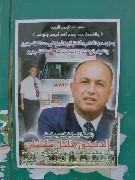 many
pock-marked, burned, and crumbling buildings in what was already a situation
approaching squalor. The latest "martyr" posters were posted, including
one of Dr. Khalil Suleiman who
was killed while trying to evacuate an injured girl from the Camp.
The people were clearly moved, especially upon hearing that the collections
had begun with the students of the Latin School. We then headed off
to the Beit al-'Azza (the house of mourning), in which families
of the 15 killed were receiving people. It was the third day after
their deaths, as is traditional in Arab society for visitation and condolences.
We drank our bitter coffee and left. It was much more of a symbolic
and official visit than we were expecting (as foreigners, we are used to
being taken to all of the places of destruction and having them pointed
out to us), but today we were participating as part of the village delegation,
most of whom didn't need another tour of destruction. many
pock-marked, burned, and crumbling buildings in what was already a situation
approaching squalor. The latest "martyr" posters were posted, including
one of Dr. Khalil Suleiman who
was killed while trying to evacuate an injured girl from the Camp.
The people were clearly moved, especially upon hearing that the collections
had begun with the students of the Latin School. We then headed off
to the Beit al-'Azza (the house of mourning), in which families
of the 15 killed were receiving people. It was the third day after
their deaths, as is traditional in Arab society for visitation and condolences.
We drank our bitter coffee and left. It was much more of a symbolic
and official visit than we were expecting (as foreigners, we are used to
being taken to all of the places of destruction and having them pointed
out to us), but today we were participating as part of the village delegation,
most of whom didn't need another tour of destruction. |
|
Tuesday 3/12/02: Optimism about Zinni bringing peace is fading. He's due on Thursday (two days), and this morning the Israeli army killed nineteen in Gaza. What frustrates us is that we feel like we can predict the next few days. Like the last two times, the IDF will go on the offensive and kill a bunch of Palestinians before Zinni arrives. Zinni will arrive in time to witness the Palestinians' revenge killings. A whirlwind of senseless killing, or a manipulative bloody machination? Cynicism is contagious. |
|
Wednesday 3/13/02: The words coming through our emails, the images coming across our television screens (the constant companion of life here), and the stories coming from our friends are getting more and more disturbing. The Friends' School in Ramallah (where Marthame first visited Palestine eight years ago) is being used by the Israeli military as a base of operations. Students from Zababdeh who are studying in Bethlehem were pinned down for days (living on the edge of 'Azza refugee camp) and made a harrowing escape sprinting through the narrow streets - they eventually made it back safe and sound to Zababdeh, but their nearly hour-long run was full from beginning to end with the fear of death. Meanwhile, the round-ups in the Tulkarem refugee camps have reached the abyss of Israeli immorality - men were bound with plastic handcuffs (like the kind used to bind electrical cords together) by the hundreds, corralled, and numbers were written on their forearms "to assist with the interrogation process" before most of them were released. At least the outcry from Israeli Holocaust survivors has been heard in response. |
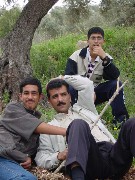 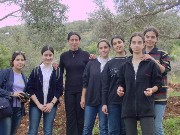 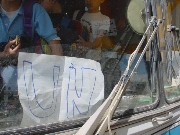 Thursday
3/14/02: Marthame headed out in the morning with the 10th graders
for their class picnic. As they were leaving the school, word came
again about the movement of tanks near Jenin. Even though half a
dozen of the 10th graders are from Jenin and beyond, we headed up anyway
with cellphones in tow to keep an ear on things. As they walked into
the hills, Marthame heard an Apache helicopter overhead. "You know
the difference between Apaches and F-16s because you're an American," one
student told him. "Nope - it's from living in Palestine," Marthame
answered, much to their delight. Sure enough, a half hour into the
picnic, we got the call that we were (once again) closing school early
and hustling kids back to Jenin. We both joined the busses, more
to keep the students calm than to do anything concrete. One of Marthame's
students remarked, "You'll see us on TV soon wearing plastic handcuffs".
One student grinned as he made a "UN" sign to put at the front of the bus.
We arrived to find everything closed in Jenin - except the bakery, which
was packed - but Thursday
3/14/02: Marthame headed out in the morning with the 10th graders
for their class picnic. As they were leaving the school, word came
again about the movement of tanks near Jenin. Even though half a
dozen of the 10th graders are from Jenin and beyond, we headed up anyway
with cellphones in tow to keep an ear on things. As they walked into
the hills, Marthame heard an Apache helicopter overhead. "You know
the difference between Apaches and F-16s because you're an American," one
student told him. "Nope - it's from living in Palestine," Marthame
answered, much to their delight. Sure enough, a half hour into the
picnic, we got the call that we were (once again) closing school early
and hustling kids back to Jenin. We both joined the busses, more
to keep the students calm than to do anything concrete. One of Marthame's
students remarked, "You'll see us on TV soon wearing plastic handcuffs".
One student grinned as he made a "UN" sign to put at the front of the bus.
We arrived to find everything closed in Jenin - except the bakery, which
was packed - but 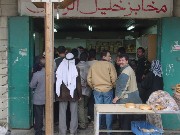 traffic
(though light) seemed to be coming and going with some regularity.
No tanks on the roads, no closing off of Jenin Camp. Perhaps we acted
hastily, but with the military attacks increasing all over the West Bank,
it seems best to err on the side of caution. The situation in Ramallah
and Bethlehem just seems to be getting worse, including the shelling of
a statue of Mary at a Bethlehem church and hospital. Palestinian
doctors have been circulating desperate calls for help - the International
Red Cross has suspended its operations in Ramallah after they were attacked
by Israeli forces, and the hospital is down to a seven-hour supply of oxygen.
It's an emergency situation operating without any emergency services functioning.
We headed up to the University to try
and put in some emotional distance for our own good. We joined with
a few of the other ex-pats for food and an Irish movie whose only highlight
was the Thin Lizzy-heavy soundtrack (audio
- 3 sec.). traffic
(though light) seemed to be coming and going with some regularity.
No tanks on the roads, no closing off of Jenin Camp. Perhaps we acted
hastily, but with the military attacks increasing all over the West Bank,
it seems best to err on the side of caution. The situation in Ramallah
and Bethlehem just seems to be getting worse, including the shelling of
a statue of Mary at a Bethlehem church and hospital. Palestinian
doctors have been circulating desperate calls for help - the International
Red Cross has suspended its operations in Ramallah after they were attacked
by Israeli forces, and the hospital is down to a seven-hour supply of oxygen.
It's an emergency situation operating without any emergency services functioning.
We headed up to the University to try
and put in some emotional distance for our own good. We joined with
a few of the other ex-pats for food and an Irish movie whose only highlight
was the Thin Lizzy-heavy soundtrack (audio
- 3 sec.). |
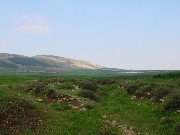 Friday
3/15/02: Today begins our three day weekend. Normally we
have Fridays and Sundays off (the Muslim and Christian holy days), but
have school on Saturday. Today is Muslim New Year, and mid-semester
exams begin Monday, so we're taking a holiday tomorrow. Ilhamdulillah
(praise God). We set out in the afternoon towards the forest near
the village of Raba, but were intrigued by a seasonally dry streambed we
saw as we walked along the road. We spent the next hour or so Friday
3/15/02: Today begins our three day weekend. Normally we
have Fridays and Sundays off (the Muslim and Christian holy days), but
have school on Saturday. Today is Muslim New Year, and mid-semester
exams begin Monday, so we're taking a holiday tomorrow. Ilhamdulillah
(praise God). We set out in the afternoon towards the forest near
the village of Raba, but were intrigued by a seasonally dry streambed we
saw as we walked along the road. We spent the next hour or so 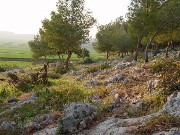 traversing
the pastures along its lush and flowered banks, hidden from the world by
the tall fields of wheat on either side. We re-emerged onto the road
to find a father picnic-ing with his children. He thought we were
lost (trying to find Zababdeh), and was naturally curious about our presence
here. It's a conversation we've had a million times, (Welcome! Where
are you from? America? Welcome!) but it somehow never ceases to surprise
us - perhaps because the image of Palestinians and Arabs with which we
are raised in the West is so different from what we experience day after
day here. We arrived at the forest, a strikingly different place
- green and rocky, full of pine trees and conifers (not an olive tree or
cactus in sight). The sights and smells reminded us of good, peaceful
times in the Colorado Rockies. As we headed back towards town, we
ran into our mechanic (from the days when
our
car was having an affair with him - at least that's our theory as to
why it was in his garage so often) who insisted we join him for coffee
in Raba. We visited with his family
of six children - all boys - the youngest of whom (two years old) already
knows the English words "car", "apple", and "umbrella." traversing
the pastures along its lush and flowered banks, hidden from the world by
the tall fields of wheat on either side. We re-emerged onto the road
to find a father picnic-ing with his children. He thought we were
lost (trying to find Zababdeh), and was naturally curious about our presence
here. It's a conversation we've had a million times, (Welcome! Where
are you from? America? Welcome!) but it somehow never ceases to surprise
us - perhaps because the image of Palestinians and Arabs with which we
are raised in the West is so different from what we experience day after
day here. We arrived at the forest, a strikingly different place
- green and rocky, full of pine trees and conifers (not an olive tree or
cactus in sight). The sights and smells reminded us of good, peaceful
times in the Colorado Rockies. As we headed back towards town, we
ran into our mechanic (from the days when
our
car was having an affair with him - at least that's our theory as to
why it was in his garage so often) who insisted we join him for coffee
in Raba. We visited with his family
of six children - all boys - the youngest of whom (two years old) already
knows the English words "car", "apple", and "umbrella." |
|
Saturday 3/16/02: Day two of an actual weekend. We invited the ex-pats over for a party/get-together/potluck gathering. Now that our numbers have been depleted by six (including a couple who were, in many ways, the glue for the group), and given the absolute chaos of the death tolls of the last few weeks, it seems absolutely vital to get together. We did so not only to give each other a break and some support, but also to talk about what - if anything - more we could be doing to participate in peace-making and justice issues in our immediate area. Most people are writing a great deal now, but trying to find Western newspapers willing to publish a view "outside the mainstream" is much like beating your head against a wall. Particularly for teachers, the unreliable situation makes planning an impossibility. But we gained much strength from hearing how others were coping and brainstorming about other possibilities. Fruitful. We also watched a short spot which is currently in heavy rotation on Lebanese TV which shows scenes of Israeli and Palestinian funerals as well as Israeli soldiers and Palestinian civilians while Bruce Springsteen's version of "War" plays in the background (audio - 8 sec. or video - 44 sec.). It ends powerfully with the message "Arabs Want Peace." So do we, my friends, so do we... |
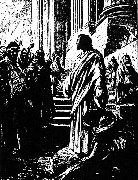 Sunday
3/17/02: Marthame joined Abuna Aktham in worship leadership this
morning at the Latin Church of Visitation. The lectionary was the
calling of the disciple Matthew from his work as a tax collector.
Somehow fitting as we head into Lent to hear the message that even such
scoundrels were welcome among Christ's inner-circle. Sunday
3/17/02: Marthame joined Abuna Aktham in worship leadership this
morning at the Latin Church of Visitation. The lectionary was the
calling of the disciple Matthew from his work as a tax collector.
Somehow fitting as we head into Lent to hear the message that even such
scoundrels were welcome among Christ's inner-circle. 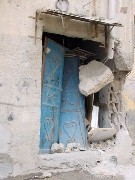 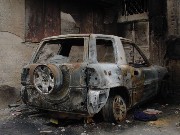 Lent
in Zababdeh is celebrated on the Eastern calendar (while Christmas
is celebrated on the Western), which means its starts this week.
We're planning to fast Eastern-style, which means basically living as vegans
until Easter - that includes Sundays. But we've got a few days -
we headed up to Jenin today to visit a Christian family affiliated with
the school whom we've visited previously. The situation was "normal,"
but tank activity on the Haifa road had
people nervous in town. Our friends just finished the renovations
on their house and were excited to show it off and stuff us full of food.
They also took us back to Jenin Refugee Camp (not more
than five minutes from their house) to see some of the scenes of destruction.
Our visit a few days ago was wonderful, but we had little chance to see
what actually happened. Walls were destroyed, parked cars were crushed
under tank wheels, houses were full of bullet holes. The narrower
streets were relatively pockmark-free, since the tanks were too wide.
Roughly 25,000 people live in Jenin Camp, a third of the population of
the city, all refugees and their descendants from the 1948 expulsion of
Arabs from Israel proper. At first, they lived in tents, but then
began to build irregular housing - their living conditions are reminiscent
of the coloñias along the Mexican-American border.
Add to that the military activity of 50-60 tanks, air support, and who
knows how many soldiers, and you begin to get a picture of what life is
like now. We saw Dr. Khalil's
ambulance as well as the graves of six of the camp's dead - they were
killed in the midst of the attack, but the Israeli army was in the middle
of the cemetery. Their families brought them to a traffic circle
on the outskirts of town and buried them (to obey Muslim burial prescriptions
requiring burial the same day). Their makeshift Lent
in Zababdeh is celebrated on the Eastern calendar (while Christmas
is celebrated on the Western), which means its starts this week.
We're planning to fast Eastern-style, which means basically living as vegans
until Easter - that includes Sundays. But we've got a few days -
we headed up to Jenin today to visit a Christian family affiliated with
the school whom we've visited previously. The situation was "normal,"
but tank activity on the Haifa road had
people nervous in town. Our friends just finished the renovations
on their house and were excited to show it off and stuff us full of food.
They also took us back to Jenin Refugee Camp (not more
than five minutes from their house) to see some of the scenes of destruction.
Our visit a few days ago was wonderful, but we had little chance to see
what actually happened. Walls were destroyed, parked cars were crushed
under tank wheels, houses were full of bullet holes. The narrower
streets were relatively pockmark-free, since the tanks were too wide.
Roughly 25,000 people live in Jenin Camp, a third of the population of
the city, all refugees and their descendants from the 1948 expulsion of
Arabs from Israel proper. At first, they lived in tents, but then
began to build irregular housing - their living conditions are reminiscent
of the coloñias along the Mexican-American border.
Add to that the military activity of 50-60 tanks, air support, and who
knows how many soldiers, and you begin to get a picture of what life is
like now. We saw Dr. Khalil's
ambulance as well as the graves of six of the camp's dead - they were
killed in the midst of the attack, but the Israeli army was in the middle
of the cemetery. Their families brought them to a traffic circle
on the outskirts of town and buried them (to obey Muslim burial prescriptions
requiring burial the same day). Their makeshift 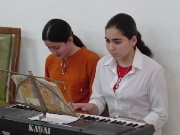 graves
are marked with cinder blocks. We returned back to visit with our
friends in Jenin and some of their family from graves
are marked with cinder blocks. We returned back to visit with our
friends in Jenin and some of their family from 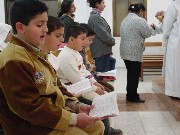 Zababdeh
only to find out that there had been two suicide attacks within Israel.
Add that to the Palestinians killed in the last few days, and we have another
potential collapse on our hands. Hopefully not, though, because people
here can't take much more. We also learned something on the theological
front. Apparently, Orthodox Lent (or "Fast" as its referred to here)
starts tomorrow. Too many dairy products in the fridge, so we've
decided to begin our Orthodox fast with the Latin church (how's that for
ecumenical?). We headed off for church in the afternoon (since Sunday
is a work day in largely-Muslim Jenin, morning worship is impossible for
most) at the Latin Church - as we hit the road, it began to hail (audio
- 5 sec.)! Abuna Alfons, who used to be in Zababdeh, is the parish
priest for the 50 or 60 parishioners (most of whom come to Sunday Mass)
and is assisted by three Italian sisters from the order of St. Anne.
They are also responsible for the Latin Church in Burqin.
It was good to get a chance to worship with the community there, many of
whom send their children to the school in Zababdeh. Zababdeh
only to find out that there had been two suicide attacks within Israel.
Add that to the Palestinians killed in the last few days, and we have another
potential collapse on our hands. Hopefully not, though, because people
here can't take much more. We also learned something on the theological
front. Apparently, Orthodox Lent (or "Fast" as its referred to here)
starts tomorrow. Too many dairy products in the fridge, so we've
decided to begin our Orthodox fast with the Latin church (how's that for
ecumenical?). We headed off for church in the afternoon (since Sunday
is a work day in largely-Muslim Jenin, morning worship is impossible for
most) at the Latin Church - as we hit the road, it began to hail (audio
- 5 sec.)! Abuna Alfons, who used to be in Zababdeh, is the parish
priest for the 50 or 60 parishioners (most of whom come to Sunday Mass)
and is assisted by three Italian sisters from the order of St. Anne.
They are also responsible for the Latin Church in Burqin.
It was good to get a chance to worship with the community there, many of
whom send their children to the school in Zababdeh. |
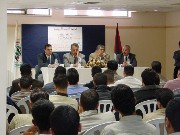 Monday
3/18/02: Yesterday we heard that there was an Israeli tank Monday
3/18/02: Yesterday we heard that there was an Israeli tank 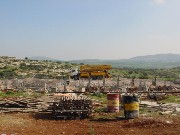 parked
on the road between Tubas and Aqaba (just south of Zababdeh), which caused
us to wonder if we would be seeing our many Tubas
students and teachers. As it turned out, they were able to come -
the tank left, but the army first brought a bulldozer to dig up the road.
Teachers and students found a detour and fortunately were able to come
to school. Such things like that don't even register on people's
radar screens anymore, let alone make the news. Nevertheless, they
perpetuate and spread hopelessness. Marthame headed up to the University
today to continue some conversations about how to find ways to connect
our work with theirs. He arrived to find a panel discussion on the
current situation led by several professors from several different fields.
Unfortunately, it was in Arabic, so the gist was gotten rather than the
nuances of the talks. The University continues to expand in the midst
of the chaos, as building continues uninterrupted. It's a dramatic
sign of hope in this part of the world. parked
on the road between Tubas and Aqaba (just south of Zababdeh), which caused
us to wonder if we would be seeing our many Tubas
students and teachers. As it turned out, they were able to come -
the tank left, but the army first brought a bulldozer to dig up the road.
Teachers and students found a detour and fortunately were able to come
to school. Such things like that don't even register on people's
radar screens anymore, let alone make the news. Nevertheless, they
perpetuate and spread hopelessness. Marthame headed up to the University
today to continue some conversations about how to find ways to connect
our work with theirs. He arrived to find a panel discussion on the
current situation led by several professors from several different fields.
Unfortunately, it was in Arabic, so the gist was gotten rather than the
nuances of the talks. The University continues to expand in the midst
of the chaos, as building continues uninterrupted. It's a dramatic
sign of hope in this part of the world. |
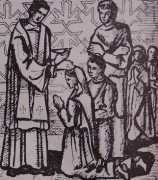 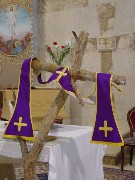 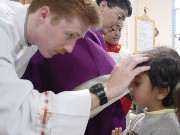 Wednesday
3/20/02: Today is Arba'a al-Rimad (Ash Wednesday), the
first day of Lent. Since the churches in Zababdeh celebrate Christmas
on the Western calendar, Easter (and Lent as a result) is celebrated on
the Eastern calendar. There were two Masses today at the Latin Church
of Visitation, the first being for the school. Marthame and Abuna
Aktham both administered the imposition of ashes (which, for about 500
people, took quite a while). Preparations also continue for the 'Eid
al-Um (Mother's Day) party tomorrow. Some people are upset, claiming
that it is disrespectful to those who have died in the Intifada
(or, as some are calling it now, the Palestinian War of Independence) to
have a celebration in the midst of the tragedies. Most people, however,
see it quite differently - part of the celebration will be in honor of
the mothers of those who have been killed during the
Intifada.
Today was the final dress rehearsal. The sound system is much better
than last year's, and Marthame has been doubling
both as a guitarist (audio - 5 sec.) and
as engineer (seven years of college
radio have finally paid off). Wednesday
3/20/02: Today is Arba'a al-Rimad (Ash Wednesday), the
first day of Lent. Since the churches in Zababdeh celebrate Christmas
on the Western calendar, Easter (and Lent as a result) is celebrated on
the Eastern calendar. There were two Masses today at the Latin Church
of Visitation, the first being for the school. Marthame and Abuna
Aktham both administered the imposition of ashes (which, for about 500
people, took quite a while). Preparations also continue for the 'Eid
al-Um (Mother's Day) party tomorrow. Some people are upset, claiming
that it is disrespectful to those who have died in the Intifada
(or, as some are calling it now, the Palestinian War of Independence) to
have a celebration in the midst of the tragedies. Most people, however,
see it quite differently - part of the celebration will be in honor of
the mothers of those who have been killed during the
Intifada.
Today was the final dress rehearsal. The sound system is much better
than last year's, and Marthame has been doubling
both as a guitarist (audio - 5 sec.) and
as engineer (seven years of college
radio have finally paid off). |
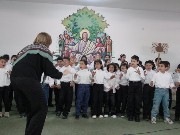 Thursday
3/21/02: Happy Mother's Day. Today, despite the hubbub
regarding it, the Mother's Day party went ahead as originally planned.
The hall was full, Marthame manned the sound boards, and Elizabeth nervously
prepared her "Itsy-bitsy choir," selected from the first through fourth
grade. There were speeches, folk dancing, patriotic songs, songs about
love, and, Thursday
3/21/02: Happy Mother's Day. Today, despite the hubbub
regarding it, the Mother's Day party went ahead as originally planned.
The hall was full, Marthame manned the sound boards, and Elizabeth nervously
prepared her "Itsy-bitsy choir," selected from the first through fourth
grade. There were speeches, folk dancing, patriotic songs, songs about
love, and, 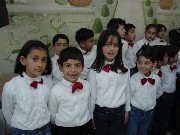 of
course, a song about spiders. There was a nationalist sketch in the
middle of it, a mother wailing over her dead son, the children dressed
accordingly: girls in traditional embroidered dresses and white headscarves
and boys dressed as teachers, doctors, and fighters, complete with plastic
weapons. The "dead" boy was wrapped in the Palestinian flag. All
in all, a fairly accurate representation of a "martyr"'s funeral.
It was, quite frankly, hard for us to watch, as the boys waved their guns.
It is difficult to sit on both sides of the fence when it comes to violent
resistance to occupation. On one hand, we both acknowledge (as affirmed
in international law) that people have a right to use violence to fight
for their freedom. And we recall what we've been taught, told, and annually
celebrate, that freedom fighters in the nascent USA took up arms to liberate
our country from oppression. And oppression is indeed at its peak here
- detentions, killings, closures, curfew, home demolitions, degradation.
But there is a difference between fighting soldiers and killing civilians.
And, even more importantly, there is a difference between a political right
and a moral one. As Christians, our first allegiance is one of faith, not
politics. And our faith is clear that killing is wrong, and that the answer
to hatred and violence should be love. And so we sat, uncomfortably,
viewing the skit, illustrating a political right but a moral wrong.
But fortunately, it was only one skit, and most of the party was just that
- a party, and for mothers. In the afternoon, one of the village's
youth leaders took a group of about forty kids up for a solidarity visit
to Jenin Refugee Camp. Marthame went with them
as one of the chaperones, his third trip in a couple of weeks. of
course, a song about spiders. There was a nationalist sketch in the
middle of it, a mother wailing over her dead son, the children dressed
accordingly: girls in traditional embroidered dresses and white headscarves
and boys dressed as teachers, doctors, and fighters, complete with plastic
weapons. The "dead" boy was wrapped in the Palestinian flag. All
in all, a fairly accurate representation of a "martyr"'s funeral.
It was, quite frankly, hard for us to watch, as the boys waved their guns.
It is difficult to sit on both sides of the fence when it comes to violent
resistance to occupation. On one hand, we both acknowledge (as affirmed
in international law) that people have a right to use violence to fight
for their freedom. And we recall what we've been taught, told, and annually
celebrate, that freedom fighters in the nascent USA took up arms to liberate
our country from oppression. And oppression is indeed at its peak here
- detentions, killings, closures, curfew, home demolitions, degradation.
But there is a difference between fighting soldiers and killing civilians.
And, even more importantly, there is a difference between a political right
and a moral one. As Christians, our first allegiance is one of faith, not
politics. And our faith is clear that killing is wrong, and that the answer
to hatred and violence should be love. And so we sat, uncomfortably,
viewing the skit, illustrating a political right but a moral wrong.
But fortunately, it was only one skit, and most of the party was just that
- a party, and for mothers. In the afternoon, one of the village's
youth leaders took a group of about forty kids up for a solidarity visit
to Jenin Refugee Camp. Marthame went with them
as one of the chaperones, his third trip in a couple of weeks. 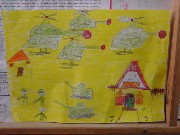 Most
of the kids hadn't been to Jenin in over a year, and few of them - if any
- had ever been to Jenin Camp. This youth leader is particularly
interested in working with the Christian kids of the West Bank to deepen
their faith to understand better what it means to be a Christian in a predominantly
Muslim Palestinian society. Today was focused towards both goals.
The children visited one the camp's cultural Most
of the kids hadn't been to Jenin in over a year, and few of them - if any
- had ever been to Jenin Camp. This youth leader is particularly
interested in working with the Christian kids of the West Bank to deepen
their faith to understand better what it means to be a Christian in a predominantly
Muslim Palestinian society. Today was focused towards both goals.
The children visited one the camp's cultural 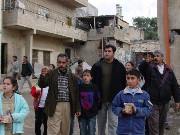 centers
and then headed out in groups to visit the homes of the mothers of martyrs
(because it's Mother's Day). They brought each mother a candle, a
sign of hope and faith, with the Scripture passage "No one has greater
love than this, to lay down one's life for one's friends." (John 15:13)
As we went around, the camp leaders made no distinction between those martyrs
who were killed because they happened to go out on their balcony at the
wrong time or those who were resisting the Israeli invasion of the camp
or those who blew themselves up in a suicide bombing in Israel. Again,
hard to stomach as an outsider. Every death is seen as connected to a transcendent
ideal of martyrdom in the war for independence. The justification among
Palestinians who support suicide bombings is - for the most part - not
the rightness of it, but the claim that Israelis took innocent life first
in this conflict and have taken more of it. An eye for an eye. That,
and the belief that only more pain and fear and loss will make the enemy
listen and change - a misguided perspective held by many on both sides
of this conflict. And so we're left with nothing but pain and fear and
loss for everyone. As we walked around, a group of children from the camp
began to follow us around - curious at the group of outsiders dressed nicely
and carrying candles through the streets. They centers
and then headed out in groups to visit the homes of the mothers of martyrs
(because it's Mother's Day). They brought each mother a candle, a
sign of hope and faith, with the Scripture passage "No one has greater
love than this, to lay down one's life for one's friends." (John 15:13)
As we went around, the camp leaders made no distinction between those martyrs
who were killed because they happened to go out on their balcony at the
wrong time or those who were resisting the Israeli invasion of the camp
or those who blew themselves up in a suicide bombing in Israel. Again,
hard to stomach as an outsider. Every death is seen as connected to a transcendent
ideal of martyrdom in the war for independence. The justification among
Palestinians who support suicide bombings is - for the most part - not
the rightness of it, but the claim that Israelis took innocent life first
in this conflict and have taken more of it. An eye for an eye. That,
and the belief that only more pain and fear and loss will make the enemy
listen and change - a misguided perspective held by many on both sides
of this conflict. And so we're left with nothing but pain and fear and
loss for everyone. As we walked around, a group of children from the camp
began to follow us around - curious at the group of outsiders dressed nicely
and carrying candles through the streets. They 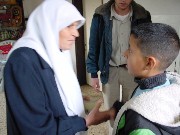 latched
onto what made us most identifiably different from them, our latched
onto what made us most identifiably different from them, our 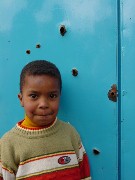 Christian
faith, and began to taunt. It was strange to really connect with
what it means to be a minority because of one's faith. Our hosts
from the Camp, both adults and youth, were clearly embarrassed and enraged
by this taunting. In spite of their attempts to disperse the kids, they
still followed. While we waited for the bus to pick us up to take
us back to Zababdeh, a couple of them threw stones - one hitting a girl
on the leg, scaring her more than hurting. As we talked to the kids
about this, it was clear they were concerned about "why?" Those who
know this place much better than we do, the older youth and young adults
who live in Zababdeh, were able to help them understand. First of
all, they explained, the kids taunted us mostly because we were outsiders
- outsiders who clearly have more money and a better life than them. If
the visiting kids had been from Jenin, the same would've happened.
Second, the kids in the camp live in terrible conditions, facing overcrowding,
poverty, poor sanitation, and few opportunities for the future. That doesn't
necessarily mean poor behavior or resentment - as our hosts demonstrated
- but it doesn't help. Third, as refugees, they have come to distrust
outsiders - both the Israelis who created the refugee crisis in the first
place and perpetuate its harshness under a brutal Occupation, and the Palestinians
who have done little for them under PA rule (including slowly moving the
refugee demands off of the negotiating table). Fourth is the religious
difference. To put it as the main reason would be wrong, but to ignore
it would also be wrong. It's clear that the need for such visits
to increase understanding are even more needed. A tough day to explain
and to swallow. Christian
faith, and began to taunt. It was strange to really connect with
what it means to be a minority because of one's faith. Our hosts
from the Camp, both adults and youth, were clearly embarrassed and enraged
by this taunting. In spite of their attempts to disperse the kids, they
still followed. While we waited for the bus to pick us up to take
us back to Zababdeh, a couple of them threw stones - one hitting a girl
on the leg, scaring her more than hurting. As we talked to the kids
about this, it was clear they were concerned about "why?" Those who
know this place much better than we do, the older youth and young adults
who live in Zababdeh, were able to help them understand. First of
all, they explained, the kids taunted us mostly because we were outsiders
- outsiders who clearly have more money and a better life than them. If
the visiting kids had been from Jenin, the same would've happened.
Second, the kids in the camp live in terrible conditions, facing overcrowding,
poverty, poor sanitation, and few opportunities for the future. That doesn't
necessarily mean poor behavior or resentment - as our hosts demonstrated
- but it doesn't help. Third, as refugees, they have come to distrust
outsiders - both the Israelis who created the refugee crisis in the first
place and perpetuate its harshness under a brutal Occupation, and the Palestinians
who have done little for them under PA rule (including slowly moving the
refugee demands off of the negotiating table). Fourth is the religious
difference. To put it as the main reason would be wrong, but to ignore
it would also be wrong. It's clear that the need for such visits
to increase understanding are even more needed. A tough day to explain
and to swallow. |
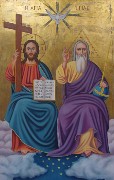 Friday
3/22/02: Marthame headed down this morning with Abuna To'mie
to worship at the Greek Orthodox Church of the Holy Trinity in nearby Tubas.
They waited beside the road in Zababdeh for nearly an hour for a taxi -
Fridays don't have much traffic in a Muslim society, and very few people
are going to Jenin these days if it's not necessary. Friday
3/22/02: Marthame headed down this morning with Abuna To'mie
to worship at the Greek Orthodox Church of the Holy Trinity in nearby Tubas.
They waited beside the road in Zababdeh for nearly an hour for a taxi -
Fridays don't have much traffic in a Muslim society, and very few people
are going to Jenin these days if it's not necessary. 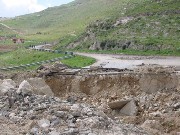 They
took the opportunity to talk theology, particularly as Abuna To'mie tries
to understand just what a "Presbyterian" is. We've visited this small
Christian community several times before, and seeing them again with Abuna
To'mie is a treat. It was also nice to be among a minority community
whose position is respected (rather than taunted) in the community.
After church, Marthame caught a taxi to Nablus (traffic to Nablus on Fridays
is pretty light, too). A friend from Zababdeh was headed to Nablus
to his work at St. Luke's Anglican hospital, so they were able to share
the ride. After passing through the lovely village of Beidan (in
former years a playground for folks in the area), the road suddenly stopped
- it has been ripped to shreds by Israeli bulldozers. Fortunately,
it hadn't rained, which made passing it a bit easier - the taxi was able
to creep a little further than usual. But we were still left with
a walk of at least a mile and a half uphill. When we first came,
this was one of our favorite (for the views) and despised (for the car
sickness) roads. Now, it is carved up, blocked, destroyed, dug out.
It is especially infuriating because at no point does the road end up leading
to Israeli camps or settlements. Its destruction seems to serve no other
purpose than collective punishment. Marthame imagined what it would be
like to They
took the opportunity to talk theology, particularly as Abuna To'mie tries
to understand just what a "Presbyterian" is. We've visited this small
Christian community several times before, and seeing them again with Abuna
To'mie is a treat. It was also nice to be among a minority community
whose position is respected (rather than taunted) in the community.
After church, Marthame caught a taxi to Nablus (traffic to Nablus on Fridays
is pretty light, too). A friend from Zababdeh was headed to Nablus
to his work at St. Luke's Anglican hospital, so they were able to share
the ride. After passing through the lovely village of Beidan (in
former years a playground for folks in the area), the road suddenly stopped
- it has been ripped to shreds by Israeli bulldozers. Fortunately,
it hadn't rained, which made passing it a bit easier - the taxi was able
to creep a little further than usual. But we were still left with
a walk of at least a mile and a half uphill. When we first came,
this was one of our favorite (for the views) and despised (for the car
sickness) roads. Now, it is carved up, blocked, destroyed, dug out.
It is especially infuriating because at no point does the road end up leading
to Israeli camps or settlements. Its destruction seems to serve no other
purpose than collective punishment. Marthame imagined what it would be
like to 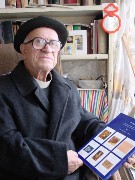 head
out for a commute along Chicago's Lake Shore Drive and find out that it
had been completely destroyed - the difference being that, head
out for a commute along Chicago's Lake Shore Drive and find out that it
had been completely destroyed - the difference being that, 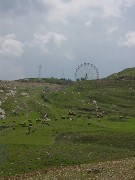 with
Lake Shore Drive, there would always be alternate routes, not involving
a mile-and-a-half hike. They finally reached the other side of the
destruction and the waiting taxis, just under the shadow of the most surreal
sight in the Northern West Bank - a restaurant in an old airplane under
the shadow of a ferris wheel...Marthame arrived in Nablus and headed to
the British Council. We are hoping
to strengthen connections between the school, the Arab-American
University of Jenin, and the Council - unfortunately, they are closing
their doors in a year. The British government will leave only the
offices in East Jerusalem and Ramallah open after next March. That's
not what we were hoping for. Marthame headed from there to visit
with the Sisters of Charity and Fr. Dominick.
Fr. Dominick was the priest in Zababdeh thirty-five years ago, when electricity
first came to town. He is now 87 years old and isn't as active as
he once was, but he is putting the finishing touches on a six-volume series
of books for use by Arabic Christian families in their homes. They
are quite exquisite, with beautiful pictures and elegant ideas. It's
always a treat to visit with Fr. Dominick. Marthame then headed to
the Anglican Convent tucked in the corner of Nablus' Old City to connect
with Fr. Hossam and our other friends there. The rest of the night
was spent visiting and watching the local Nablus TV station and its selection
of American movies (including the Dennis Rodman vehicle Simon Sez)
and locally-produced ads (which all seemed to use the Eagles' "New Kid
in Town" as their music bed - audio, 4
sec.). A day of surreality... with
Lake Shore Drive, there would always be alternate routes, not involving
a mile-and-a-half hike. They finally reached the other side of the
destruction and the waiting taxis, just under the shadow of the most surreal
sight in the Northern West Bank - a restaurant in an old airplane under
the shadow of a ferris wheel...Marthame arrived in Nablus and headed to
the British Council. We are hoping
to strengthen connections between the school, the Arab-American
University of Jenin, and the Council - unfortunately, they are closing
their doors in a year. The British government will leave only the
offices in East Jerusalem and Ramallah open after next March. That's
not what we were hoping for. Marthame headed from there to visit
with the Sisters of Charity and Fr. Dominick.
Fr. Dominick was the priest in Zababdeh thirty-five years ago, when electricity
first came to town. He is now 87 years old and isn't as active as
he once was, but he is putting the finishing touches on a six-volume series
of books for use by Arabic Christian families in their homes. They
are quite exquisite, with beautiful pictures and elegant ideas. It's
always a treat to visit with Fr. Dominick. Marthame then headed to
the Anglican Convent tucked in the corner of Nablus' Old City to connect
with Fr. Hossam and our other friends there. The rest of the night
was spent visiting and watching the local Nablus TV station and its selection
of American movies (including the Dennis Rodman vehicle Simon Sez)
and locally-produced ads (which all seemed to use the Eagles' "New Kid
in Town" as their music bed - audio, 4
sec.). A day of surreality... |
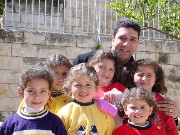 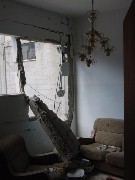 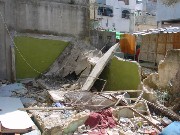 Saturday
3/23/02: Marthame spent the morning visiting with Fr. Hossam
and the children of the Anglican daycare. We are pleased to learn
that the Anglican Bishop has reconsidered some of the clergy moves, given
the current situation, and that Hossam will stay as the priest for Nablus
and Zababdeh. He will have more work than before, but now that we
know he is staying we can begin to make something akin to "plans" - many
times it seems like such a thing is counter-cultural. Marthame then
headed over to St. Luke's Anglican Hospital to visit with friends from
Nablus and Zababdeh who work there. He was introduced to one of the
workers, a man from Balata refugee camp, a place which has been in the
news much recently. The man invited Marthame to come and see what
had happened in the recent incursions. They headed down by taxi,
entering the camp off the main road across the street from the Orthodox
Church at Jacob's Well. The camp's
population is about 30,000, and most of the people are refugees and their
descendents from pre-1948 Jaffa-Tel Aviv
villages. Saturday
3/23/02: Marthame spent the morning visiting with Fr. Hossam
and the children of the Anglican daycare. We are pleased to learn
that the Anglican Bishop has reconsidered some of the clergy moves, given
the current situation, and that Hossam will stay as the priest for Nablus
and Zababdeh. He will have more work than before, but now that we
know he is staying we can begin to make something akin to "plans" - many
times it seems like such a thing is counter-cultural. Marthame then
headed over to St. Luke's Anglican Hospital to visit with friends from
Nablus and Zababdeh who work there. He was introduced to one of the
workers, a man from Balata refugee camp, a place which has been in the
news much recently. The man invited Marthame to come and see what
had happened in the recent incursions. They headed down by taxi,
entering the camp off the main road across the street from the Orthodox
Church at Jacob's Well. The camp's
population is about 30,000, and most of the people are refugees and their
descendents from pre-1948 Jaffa-Tel Aviv
villages.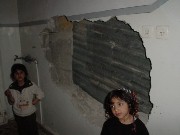 In the recent Israeli incursion, tanks, helicopters, and foot soldiers
penetrated the camp with the aim of confiscating arms, destroying bomb-making
factories, and punishing those responsible. While they did a handful
of
In the recent Israeli incursion, tanks, helicopters, and foot soldiers
penetrated the camp with the aim of confiscating arms, destroying bomb-making
factories, and punishing those responsible. While they did a handful
of 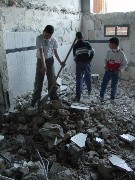 such
actions, even the Israeli military agreed that the incursion did not accomplish
its goals. What it did accomplish was leaving such
actions, even the Israeli military agreed that the incursion did not accomplish
its goals. What it did accomplish was leaving 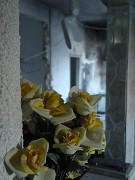 behind
a horrific scene of destruction - buildings dynamited to the ground because
a suspected terrorist was thought to live in it, homes with holes knocked
between neighbors for Israeli soldiers to enter the next door neighbor
without re-entering the street (and arrows spray-painted to show the way),
tale after tale after tale of fear, anger, hopelessness. Every house
- or where a house used to stand - Marthame visited he heard similar tales
about what happened a few weeks before - leaving in the middle of the night,
still wearing the clothes on their backs, cleaning up the mess, staying
with neighbors or family or wherever they can - as well as stories of their
villages in 1948 and the reasons they left - tanks nearby, temporary departure
until the fighting was over, protection of the young...Marthame wanted
to bring candles like the Zababdeh kids had taken to Jenin, but finding
none, instead brought plastic flowers - very popular here for some reason
- as a sign of new life and hope. Everyone was anxious to tell their
stories and - of course - offered coffee and tea. News has come out
recently that if cease-fire talks fail, Israel plans to hit the refugee
camps again. What more can be done, other than ethnic-cleansing?
The refugees have nowhere to flee, and even if they could, the spectre
of 1948's "temporary" flight weighs on their minds. Fleeing is no
longer an option. Staying and fighting is all that remains.
These scars will stay a long time... behind
a horrific scene of destruction - buildings dynamited to the ground because
a suspected terrorist was thought to live in it, homes with holes knocked
between neighbors for Israeli soldiers to enter the next door neighbor
without re-entering the street (and arrows spray-painted to show the way),
tale after tale after tale of fear, anger, hopelessness. Every house
- or where a house used to stand - Marthame visited he heard similar tales
about what happened a few weeks before - leaving in the middle of the night,
still wearing the clothes on their backs, cleaning up the mess, staying
with neighbors or family or wherever they can - as well as stories of their
villages in 1948 and the reasons they left - tanks nearby, temporary departure
until the fighting was over, protection of the young...Marthame wanted
to bring candles like the Zababdeh kids had taken to Jenin, but finding
none, instead brought plastic flowers - very popular here for some reason
- as a sign of new life and hope. Everyone was anxious to tell their
stories and - of course - offered coffee and tea. News has come out
recently that if cease-fire talks fail, Israel plans to hit the refugee
camps again. What more can be done, other than ethnic-cleansing?
The refugees have nowhere to flee, and even if they could, the spectre
of 1948's "temporary" flight weighs on their minds. Fleeing is no
longer an option. Staying and fighting is all that remains.
These scars will stay a long time... |
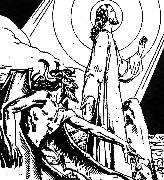 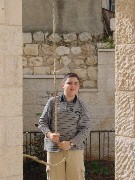  Sunday
3/24/02: Marthame and Fr. Hossam headed back to Zababdeh together,
making the reverse trek across what used to be the road from Nablus to
Beidan. One of the problems for Fr. Hossam these days is that a one-way
trip to Zababdeh is, at least, an hour - if the road gets worse, it could
be more. Commuting between the two parishes is difficult at best.
We worshiped with St. Matthew's Anglican Church, the church bells signaling
our successful arrival (audio - 5 sec.).
The churches of Zababdeh celebrate the first Sunday of Lent, reading the
temptation of Christ. It's very strange to do this while the Western
church is celebrating Palm Sunday today and, even in Jerusalem, Easter
greetings are being sent out. Fr. Aktham and the Latin parish and
school have sent theirs out, too. Marthame went by to visit the young
man who took the kids up to Jenin camp a few days ago - they're working
together on a brochure for the Palestinian Christian Youth Movement as
they attempt to gather some financial support for its work. Marthame
will head down to Jerusalem in a few days to meet with people and see what
can be done. We could see flares being shot over the hill, which
made us worry for our friends in Aqaba and Tubas. Sunday
3/24/02: Marthame and Fr. Hossam headed back to Zababdeh together,
making the reverse trek across what used to be the road from Nablus to
Beidan. One of the problems for Fr. Hossam these days is that a one-way
trip to Zababdeh is, at least, an hour - if the road gets worse, it could
be more. Commuting between the two parishes is difficult at best.
We worshiped with St. Matthew's Anglican Church, the church bells signaling
our successful arrival (audio - 5 sec.).
The churches of Zababdeh celebrate the first Sunday of Lent, reading the
temptation of Christ. It's very strange to do this while the Western
church is celebrating Palm Sunday today and, even in Jerusalem, Easter
greetings are being sent out. Fr. Aktham and the Latin parish and
school have sent theirs out, too. Marthame went by to visit the young
man who took the kids up to Jenin camp a few days ago - they're working
together on a brochure for the Palestinian Christian Youth Movement as
they attempt to gather some financial support for its work. Marthame
will head down to Jerusalem in a few days to meet with people and see what
can be done. We could see flares being shot over the hill, which
made us worry for our friends in Aqaba and Tubas. |
|
Monday 3/25/02: This morning, for some absurd reason, we woke up and watched the Oscars - live on MBC Arabic television. Before it was broadcast, though, they brought an Israeli documentary on 1948 which was then dubbed into Arabic. The absurd thing is that, with all of the claims of a tight-lipped or propaganda-fed Arab media, Arabs often see more perspectives on the story that the rest of the world does. The last thing we expected to see was an Israeli documentary, though...The lights last night were part of an Israeli operation to surround Tubas, we learned this morning, but until now nothing has happened and our teachers and students arrived as usual. Marthame headed into Jenin to take care of some business - the taxis were using yet another round-about road (even for here) - it turned out that the municipality of Qabatia is working on the road that we used to take. Since they can't get their hands on any asphalt (usually imported from Israel), they are using iron frames and pouring cement for the entire length of the road. Speculation abounds about whether or not Arafat will get to Beirut, but Reuters has published an English translation of the Arab Summit's resolution on the Palestinians. Maybe there is hope.... |
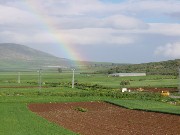 Tuesday
3/26/02: The teachers from Jenin and beyond were late this morning
- we expected it was because of Israeli road closures. Instead, it
was the road construction in Qabatia. The busses had a difficult
time finding a road that was wide enough for them (winding through the
middle of the village) and then, when they did, the rain made them muddy
and impassible! But they arrived, as did a rainbow in the Zababdeh
valley - we could see it from end to end. But no pot of gold.
Word also came about two international (they turned out to be from TIPH,
a crew of UN observers in Hebron) observers killed on a road near Hebron.
Conflicting reports have emerged about who is responsible, and TIPH is
not confirming or denying any of them - more deaths whose tragedy will
be lost by the cynical play for public opinion. Tuesday
3/26/02: The teachers from Jenin and beyond were late this morning
- we expected it was because of Israeli road closures. Instead, it
was the road construction in Qabatia. The busses had a difficult
time finding a road that was wide enough for them (winding through the
middle of the village) and then, when they did, the rain made them muddy
and impassible! But they arrived, as did a rainbow in the Zababdeh
valley - we could see it from end to end. But no pot of gold.
Word also came about two international (they turned out to be from TIPH,
a crew of UN observers in Hebron) observers killed on a road near Hebron.
Conflicting reports have emerged about who is responsible, and TIPH is
not confirming or denying any of them - more deaths whose tragedy will
be lost by the cynical play for public opinion. |
|
Wednesday 3/27/02: After school today, Marthame headed down to Jerusalem in a borrowed car with the University's development person for a series of meetings. They could've traveled through Jenin, but things are just so up in the air now, and they don't know the road with the new Qabatia construction going on - instead, they chose to take the only other road open which winds along old dirt and mud tractor trails. Not knowing the road, they hired a Zababdeh taxi to lead them out. The trip to Jerusalem was long - a combination of Passover traffic and random security checks set up around population centers. But it sure beat the tractor trails. East Jerusalem was a ghost town - most stark of all is the construction work taking place around Damascus Gate which means a large metal wall runs alongside the road - ironically the old 1967 border. It virtually cuts off Damascus Gate from the West of the city. They arrived at a nearby hostel to find everyone crowded around the TV - a suicide bombing in Netanya had killed at least 15 (a number which would continue to rise) celebrating Passover. At the hostel and in Zababdeh, Marthame and Elizabeth saw grisly scenes of the hotel's dining room, rent apart by the blast, with food still on the tables and pools of blood still on the floor. You know you've been here a while when the first reaction to violence is not the horror of the tragedy, but how it will affect your day and the coming ones. Remaining human can be difficult in the midst of all this. |
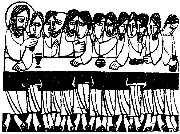 Thursday
3/28/02: It's Western Maundy Thursday. There's nothing
like waking up in a Jerusalem hostel to remind you of the sea of humanity
- a backpacking Inuit Zionist Christian, a freelance Portuguese journalist
living in Gaza's Jabaliya refugee camp, a German fruitarian Jewish convert
trying to "open minds" by getting her book published, a French Palestinian
Solidarity group. Ah, the bubbling cauldron of al-Quds...The
meetings in Bethlehem were all cancelled, as the checkpoint is sealed as
tight as a drum - even internationals are not allowed to walk across.
Some people are going through Tantur, but
it just doesn't seem like a good time to check the porousness of an Israeli
closure right now. Marthame and our friend managed to set up some
meetings in Jerusalem to talk about joint projects for the School and the
University as well as to explore some growing possibilities for youth ministry
in the Northern West Bank. It was rather encouraging. Thursday
3/28/02: It's Western Maundy Thursday. There's nothing
like waking up in a Jerusalem hostel to remind you of the sea of humanity
- a backpacking Inuit Zionist Christian, a freelance Portuguese journalist
living in Gaza's Jabaliya refugee camp, a German fruitarian Jewish convert
trying to "open minds" by getting her book published, a French Palestinian
Solidarity group. Ah, the bubbling cauldron of al-Quds...The
meetings in Bethlehem were all cancelled, as the checkpoint is sealed as
tight as a drum - even internationals are not allowed to walk across.
Some people are going through Tantur, but
it just doesn't seem like a good time to check the porousness of an Israeli
closure right now. Marthame and our friend managed to set up some
meetings in Jerusalem to talk about joint projects for the School and the
University as well as to explore some growing possibilities for youth ministry
in the Northern West Bank. It was rather encouraging. 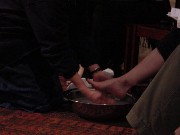 However,
word came that the internationals in Ramallah had been told by the Israeli
army to evacuate. The French group immediately headed up to Ramallah
to intervene. Meanwhile, about 300 others are being deported at Ben
Gurion Airport because they are peace activists. Things don't look
good for Elizabeth's planned travel to Jerusalem tomorrow - not many Palestinian
taxis will be getting down to However,
word came that the internationals in Ramallah had been told by the Israeli
army to evacuate. The French group immediately headed up to Ramallah
to intervene. Meanwhile, about 300 others are being deported at Ben
Gurion Airport because they are peace activists. Things don't look
good for Elizabeth's planned travel to Jerusalem tomorrow - not many Palestinian
taxis will be getting down to 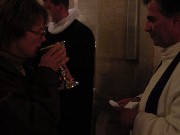 Ramallah
it seems. Marthame headed off to Jerusalem's Lutheran Church of the
Redeemer for a service of footwashing and communion. The footwashing
service was small and held in the chapel - a simple service of music (audio
- 28 sec.). The larger service was held with Redeemer's English,
German, and Arabic-speaking congregations. As the sanctuary was stripped
of its ornamentation, a traditional practice at the conclusion of Maundy
Thursday services, Psalm 118 was read in all three languages - it's thought
to be the hymn which Jesus and his disciples sang at the end of their meal.
It's refrain of "God's steadfast love endures forever" are words of hope
now that fill an echoing void. The congregation gathered outside
to walk to the Garden of Gethsemane, but Marthame had to meet some friends
for dinner. They are Americans who live between Jerusalem and Ramallah.
Until a week ago, they lived on the Jerusalem side of the checkpoint.
Then the checkpoint moved - going to and from work is now an ordeal.
Recently it has meant getting "warning shots" fired at their car.
They wondered if they'd be able to get home tonight. Things really
don't look good around here. Ramallah
it seems. Marthame headed off to Jerusalem's Lutheran Church of the
Redeemer for a service of footwashing and communion. The footwashing
service was small and held in the chapel - a simple service of music (audio
- 28 sec.). The larger service was held with Redeemer's English,
German, and Arabic-speaking congregations. As the sanctuary was stripped
of its ornamentation, a traditional practice at the conclusion of Maundy
Thursday services, Psalm 118 was read in all three languages - it's thought
to be the hymn which Jesus and his disciples sang at the end of their meal.
It's refrain of "God's steadfast love endures forever" are words of hope
now that fill an echoing void. The congregation gathered outside
to walk to the Garden of Gethsemane, but Marthame had to meet some friends
for dinner. They are Americans who live between Jerusalem and Ramallah.
Until a week ago, they lived on the Jerusalem side of the checkpoint.
Then the checkpoint moved - going to and from work is now an ordeal.
Recently it has meant getting "warning shots" fired at their car.
They wondered if they'd be able to get home tonight. Things really
don't look good around here. |
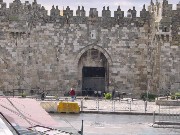 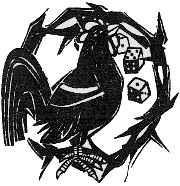 Friday
3/29/02: Good Friday. The death and burial of Christ.
When the world felt the absence of God the strongest. The closures
around Jerusalem seem to be air-tight - Damascus Gate, on a Friday morning,
is completely dead. A trickle of people and almost no cars at all.
Strange. Since Elizabeth is nursing an ear infection, it didn't seem
like spending the day in a Palestinian taxi that had no certainty of arrival
at its destination was the best course of action. Instead, she headed
on the well-worn tractor trail towards Jalame. Marthame and our friend
from the University drove up to meet her. On the way, they got a
call that Sharon had called up 20,000 reservists and the army was headed
into Ramallah. The question before us was whether it was better to
be in Jerusalem or Zababdeh - both from a standpoint of safety and duty.
On both counts, Zababdeh seemed much more appealing. We headed back
on the muddy tractor track, dodging stuck cars and stalled trucks along
the way. The rest of the day was spent glued to the TV for updates
from Ramallah. As Arafat's compound was under siege, word of another
suicide bombing in Jerusalem came. It's really bad. Really
bad. Good Friday indeed... Friday
3/29/02: Good Friday. The death and burial of Christ.
When the world felt the absence of God the strongest. The closures
around Jerusalem seem to be air-tight - Damascus Gate, on a Friday morning,
is completely dead. A trickle of people and almost no cars at all.
Strange. Since Elizabeth is nursing an ear infection, it didn't seem
like spending the day in a Palestinian taxi that had no certainty of arrival
at its destination was the best course of action. Instead, she headed
on the well-worn tractor trail towards Jalame. Marthame and our friend
from the University drove up to meet her. On the way, they got a
call that Sharon had called up 20,000 reservists and the army was headed
into Ramallah. The question before us was whether it was better to
be in Jerusalem or Zababdeh - both from a standpoint of safety and duty.
On both counts, Zababdeh seemed much more appealing. We headed back
on the muddy tractor track, dodging stuck cars and stalled trucks along
the way. The rest of the day was spent glued to the TV for updates
from Ramallah. As Arafat's compound was under siege, word of another
suicide bombing in Jerusalem came. It's really bad. Really
bad. Good Friday indeed... |
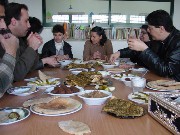 Saturday
3/30/02: We're back to Lenten time and Lenten life. Thankfully
the Israeli army didn't head north out of Ramallah like many people expected
them to. Today is "Land Day", the day meant to remember Arab-Israelis
who were killed preventing more illegal land seizures in the Galilee by
the Israeli government twenty-six years ago. Under "normal" circumstances,
the school would be open but would have special presentations. Instead,
given the fact that the Palestinian president's home and office are under
siege and being fired upon, a general strike was called. Land Day
acknowledgements will happen on Monday. While Elizabeth nursed her
ear infection, Marthame headed up to the school to find a handful of teachers
there getting ready to eat a fasting feast of hummus, beans, and za'atar
(a spice of sesame and oregano we think). Marthame was greeted with
Hammatak
bithebbak - "Your mother-in-law loves you!" - something said when your
timing makes you impeccably lucky. Meanwhile Arafat remains pinned
down in Ramallah. He is, warts and all, the symbol of Palestinian
liberation - at both its best and worst. Now he's trapped in his
home, as they are in theirs. And for that, people here understand,
pity, and respect him. Word has come from email in Ramallah that,
in addition to the tank assault, the Israeli army has taken over the Palestinian
TV station and is broadcasting pornography. Somebody's laughing somewhere,
but not us. Another suicide bombing took place in Tel Aviv - it's
not easy to fall asleep when evil persists like this. The Western
churches, meanwhile, will be gathering soon to sit vigil by the tomb.
In a land of such death, it only seems appropriate. Saturday
3/30/02: We're back to Lenten time and Lenten life. Thankfully
the Israeli army didn't head north out of Ramallah like many people expected
them to. Today is "Land Day", the day meant to remember Arab-Israelis
who were killed preventing more illegal land seizures in the Galilee by
the Israeli government twenty-six years ago. Under "normal" circumstances,
the school would be open but would have special presentations. Instead,
given the fact that the Palestinian president's home and office are under
siege and being fired upon, a general strike was called. Land Day
acknowledgements will happen on Monday. While Elizabeth nursed her
ear infection, Marthame headed up to the school to find a handful of teachers
there getting ready to eat a fasting feast of hummus, beans, and za'atar
(a spice of sesame and oregano we think). Marthame was greeted with
Hammatak
bithebbak - "Your mother-in-law loves you!" - something said when your
timing makes you impeccably lucky. Meanwhile Arafat remains pinned
down in Ramallah. He is, warts and all, the symbol of Palestinian
liberation - at both its best and worst. Now he's trapped in his
home, as they are in theirs. And for that, people here understand,
pity, and respect him. Word has come from email in Ramallah that,
in addition to the tank assault, the Israeli army has taken over the Palestinian
TV station and is broadcasting pornography. Somebody's laughing somewhere,
but not us. Another suicide bombing took place in Tel Aviv - it's
not easy to fall asleep when evil persists like this. The Western
churches, meanwhile, will be gathering soon to sit vigil by the tomb.
In a land of such death, it only seems appropriate. |
|
Sunday 3/31/02: We were awoken early in the morning by a sustained burst of gunfire coming from the direction of the Israeli camp at the edge of town. It's strange what becomes "normal" in this place. Elizabeth continued to nurse the ear infection while Marthame headed off to St. George's Orthodox Church. Having fasted "the Orthodox way," Marthame was able to take communion. The eucharist, in Orthodox practice, is fed by the priest by spoon as a mixture of bread and wine. Even - and especially - small children receive. Meanwhile, the reports coming from Ramallah are deeply disturbing. The media attention is focused on Arafat's compound while the Israeli army is conducting house-to-house searches and rounding up all men between the ages of fifteen and forty-five, for questioning, detainment, arrest. Given how such operations have gone before, we only can fear the worst. Turning off the TV becomes, at the same time, both impossible and necessary. More suicide bombings has merely confirmed that. A day of resurrection surrounded by mortality...Happy Easter. |
|
|